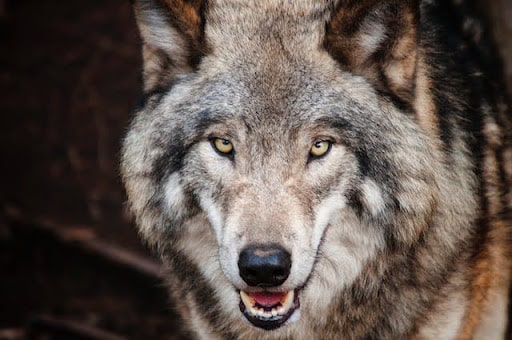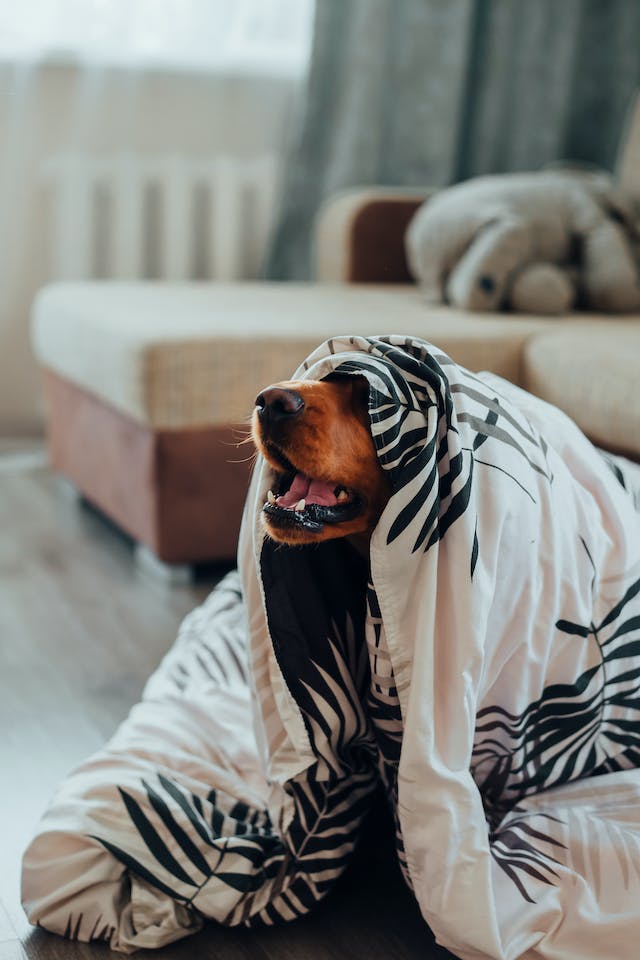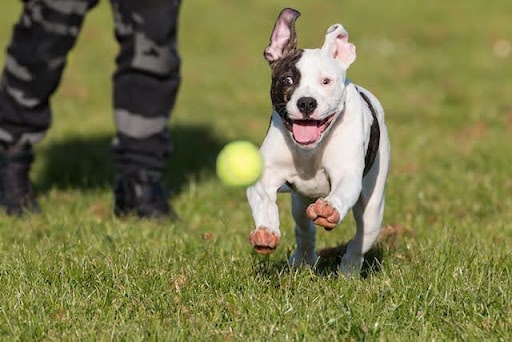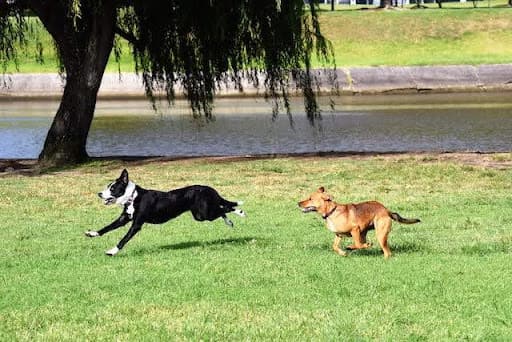
There’s a wolf in the room, just inches away from you. Muscles rippling, muzzle twitching, revealing sharp teeth beneath a curled lip. A claw-tipped paw bends and straightens, ready to pounce. A low rumbling from the back of their throat builds to a blood-curdling growl. And the wolf suddenly wakes up, falls off the sofa and rolls on their back for a reassuring tummy rub.

Do dogs dream?
Yes. Dogs do dream. They dream a lot. They just can’t tell us about their dreams. And that makes it more difficult to understand their experiences. Most of our understanding of human dreams comes from reliving them when we tell family and friends afterwards. Dogs can’t do this. But in recent years scientists have learned a lot more about dreaming by measuring electrical activity in the brains of people and animals when they’re asleep and awake. This is called EEG recording.
All conscious animals dream. And by ‘conscious’ we mean all animals who are aware of themselves and responsive to their surroundings. Just like humans, dogs go through different stages and cycles of sleep:
- Rapid eye movement or REM sleep – the deepest stage with most dreaming
- Slow wave or non-REM sleep – the progressive sinking into sleep or wakefulness
- Animals and humans are most likely to make sudden movements and sounds just as they transition between non-REM and REM sleep. All the brain activities we see in humans during sleep and dreaming are also seen in dogs.

Why do dogs dream?
Now that’s a trickier one to answer. People and animals dream for a number of reasons. And there’s still a lot we don’t understand! During dreams we are all:
- Processing information – making sense of everything that happened the day before.
- Fixing and consolidating memories – helping us and our pets remember things that have happened.
- Learning repeatable tasks – unconsciously practising easily – repeatable tasks in our sleep ready for real life.
Some evidence for learning in dreams
Scientists trained mice to get rewards while completing a maze. They recorded brain activity while the mice were doing this. Then they recorded the mental activity when the mice were asleep. The scientists discovered that the dreaming mice brain patterns and order of the brain activities were the same as when doing the maze the previous day. But sometimes the dream replay was in ‘fast forward’ about 5-6 times the speed of the real life activity. What’s more, they proved that mice learned more quickly when they were able to dream like this.
How do dogs dream?
How do any of us dream? The simple definition of a dream is to hear, see and feel things, to have thoughts and to feel emotions while asleep. EEG measurements show that when animals are dreaming, the same parts of the brain are activated that would be working in waking activities. The evidence suggests that dogs see images and colours and hear sounds when they’re dreaming, just as humans do. They seem to experience dreams the same way we do.
The big difference between sleep and wakefulness is that we can’t act out our experiences in our sleep. During REM sleep, muscles are temporarily ‘paralysed’ to prevent movement or vocalisation. The exception will be humans who have sleep disturbances or sleepwalk.
We also know that our eye movements in REM sleep seem to track movement, just as they would when watching something while awake. And although muscles may be ‘paralysed in sleep’, heart rate and breathing change as they would when we and our 4-legged friends experience something in real life.

What do dogs dream about?
And should we worry if they start growling?
The thing is, we humans don’t even know how our closest friends and family dream. We can share stories of dreams and feelings. But we can’t see inside one another’s heads. So we’ve little chance of fully understanding what dogs dream about. On the other hand, the recordings of brain signals during sleeping and waking demonstrate that the patterns of brain activation are similar to those in daily waking life.

Although our dreams can be all-action ones, our muscles relax during sleep and our brains stop us from acting them out. But if the brain isn’t working properly in humans or animals, sometimes dream movements can be acted out more fully. For example, we know that cats in deep REM sleep will show stalking and pouncing behaviour, as if hunting. So it’s fair to assume that dogs will experience life situations when they dream, just like us. And like us, they’ll dream about the life and people they know. So what about that ferocious wolf, twitching and rumbling on the sofa? Chances are there’s a dream squirrel or tennis ball somewhere in the picture and a very exciting chase!

But it also means their dreams will include the humans they love and experiences shared. Your dog’s dreams of you and things you do together help cement that happy bond ever more deeply.

Why you should always ‘let sleeping dogs lie’
We’ve all heard the expression ‘let sleeping dogs lie’. But what if your furry friend seems to be having a scary nightmare?
The dreams we suddenly jerk awake from are most likely to happen in the transitions between non-REM and REM sleep. It’s usually something frightening or very intense, like falling. And the same is likely true of dogs. So whilst your dreaming pooch won’t deliberately harm you or their housemates, avoid waking them suddenly. They’re likely to be confused and disoriented and may lash out defensively and unintentionally hurt you.

Dogs can sleep for up to 14 hours a day. The Dalai Lama says “Sleep is the best meditation”. And on that basis, our dreaming pooch could be setting the world to right or pondering the mysteries of the universe. Alas, ‘If only they could talk’. All that wisdom they could share! On the other hand, “I love sleep. It’s like a time machine to breakfast” (Unknown) is perhaps a bit more likely…











